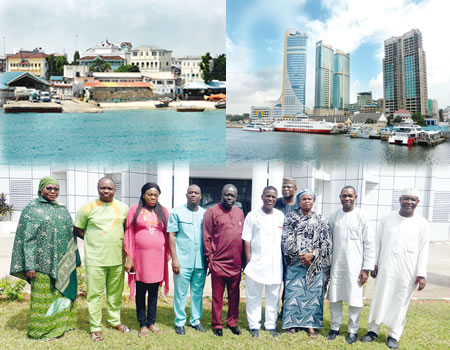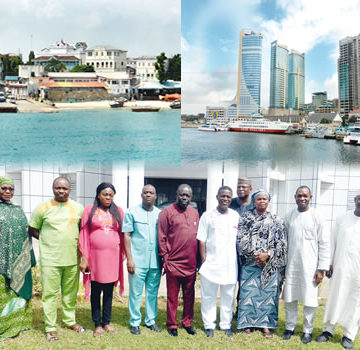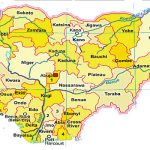THE Africa Night dinner and dance at the residence of the Vice Chancellor, University of Dar es Salaam was in top gear as scholars, students, diplomats and other guests tucked into the barbecued chicken, potatoes, plantain and fish dinner amidst clinking of wine glasses. Laughter, light hearted jokes and merriment rented the air to the background of melodious music under the June starry night. And as the DJ later changed the disc to a popular music by Nigeria’s iconic musician P Square, an electrifying mood suddenly enveloped the night as some of the students at the function immediately took to the dance floor.
Minutes later, lured by the insistent rumble of the percussions and sonorous voice, I soon found myself on the dance floor much to the students’ great delight. Before long, music, arguably the highest form of art, broke all kinds of barriers as scholars and students, diplomats and politicians, youngsters and the elderly danced the night away. It was a befitting end to the three-day Ninth Mwalimu Nyerere Intellectual Festival in the Tanzanian city of Dar es Salaam.
I had come to Tanzania, the Swahili land on the invitation of the conference organisers to deliver a paper on the conference theme; ‘’The Politician in the rise and fall of Africa.’’ The three-day dialogue was expected to explore the quality and nature of politicians in Africa as well as the challenges this category of leaders are facing in the execution of their duties among other issues. The discourse was also expected to determine how the politician in Africa had contributed to the development or underdevelopment of African countries.
And so for three good days speakers made up of political scientists, human rights activists, gender experts and former and serving Members of Parliaments made erudite presentations. Speakers paid glowing tributes to the first Tanzanian President and the father of the Tanzanian nation, Julius Nyerere to whom the conference was dedicated.
Expectedly, the politician was at the receiving end most of the time with many paper presenters inundating the audience with gory and unsavoury political scenarios allegedly perpetuated by African politicians as if the people themselves are innocent bystanders. It was indeed a difficult time to be referred to as a politician and one of my Tanzanian friends jokingly advised me not to introduce myself as a politician but as a writer and physician! Luckily, the audience seemed to agree with the focus of my presentation which was that politics is too important to be left alone in the hands of politicians, as such; the people have to be more responsive and responsible to politics and politicians.
A major highlight of the conference was Professor Patrick Lumumba’s highly entertaining and provocative paper; ‘’A call for Hygiene in African Politics.’’ The presentation by the well-known human rights lawyer with its eloquence, drama and masterly erudition delivered to a packed audience consisting mostly of students almost brought down the roof. Prof Lumumba who heaped praises on the current Tanzanian President John Magufuli whom he referred to as a ‘breath of fresh air’ for his anticorruption stand, predicted that Tanzania would in a few years’ time become one of the biggest economies in Africa if Magufuli is able to maintain his wonderful governorship tempo. Lumumba like several speakers before him also reiterated the urgent need for Africans to de-ethnicise our politics. As he put it; ’the God I worship is a God of diversity.’
And unlike many conferences where the attendance and quality usually nose dive after the first day, the conference organisers deserve to be commended for packaging the conference in such a way that attendance, tempo and high quality were maintained throughout its three day duration.
Dar es Salaam with a population of 4.36million is the commercial capital and largest city in Tanzania. It is situated in the east coast of the Indian Ocean. The original name of the city, I was told was Mzizima (tremble due to cold) but the city was renamed by its early Arab settlers as Dar es Salaam, ‘The City of Peace’. Although with about the same land size with Nigeria, Tanzania which just a population of about 56.9million people is considered to be a generally laid back country without the hustle and bustle of Nigeria. A peaceful country with friendly people and well organised transport, health and educational systems, Tanzania without the glamour and sophistication of Nigeria, is like the black and white photographic version of its African brother state.
Like Nigeria, Tanzania also has a relatively new capital city, the central city of Dodoma, to which remaining parts of the government are expected to relocate by the year 2017. Many Tanzanians are eagerly looking forward to the move to the new capital if anything else to reduce the very high rent in Dar es Salaam. ‘’ Dar is very expensive for ordinary Tanzanians due to a high presence of diplomats and expatriates who have driven up house rent to as much as $3,000 per flat in some sections of the city’’ one Tanzanian writer observed. With an exchange rate of about 2,200 Tanzanian shillings to a dollar, the cost of house rent in local currency can best be imagined. However, other daily needs such as food and transport are not that exorbitant. For a 30 minute ride in the Bajaj, the Tanzanian tricycle which is the local equivalent of Nigeria’s Keke, I paid about 500 shillings while a ride for the same period of time in the ‘DalaDala’ the Tanzanian equivalent of Nigeria’s ‘Molue’ was considerably less.
As is my usual practice when visiting a foreign country, on the first week of my arrival in Tanzania, I paid a courtesy visit to the Nigerian Embassy located at No 13 Haile Selassie Road, Oysterbay by Collassium Hotel. The ambassador, Salisu Umaru, observed that there are only 500 Nigerians made up of University lecturers and traders in the country. He also observed that most of the visa requirements from Tanzanians are for pilgrimage to Pastor T B Joshua’s church in Lagos. In view of the very high cost of rent in the city, Nigeria is said to be the only West African country with a fully functional Embassy in the country.
Actually, my most memorable stay in Tanzania was at the coastal town of Bagamoyo, a distance of about 65 kilometres north of Dar es Salaam. A town of wonderful beaches, palms and ancient history, Bagamoyo is said to mean ‘’Here I lay down my heart’’ an expression about the despair of slaves brought from the hinterland as they reached the town and for the first time, saw the sea, which must have symbolised the end of all their hopes.
The road to Bagamoyo from Dar is a well-laid highway running through several towns and communities with such delectable names as Kawe, Mizimuni, White Sands, Kunduchi, SalaSala, and Bunju among others. The evidence of a developing landscape was all around with new buildings, towns and access roads sprouting like newly planted corns on a farm. In the far distance, a hovering mist above the early morning sun gave a magical appearance to a handsome but winningly humble country. To protect the small towns from reckless drivers, the speed limit in the towns was 50km/hour. In addition to the speed limits were warning signs in Kiswahili, the official language of Tanzania: as ‘Nenda Pole Pole’ (Go slowly). To effect the traffic regulations were the ubiquitous ‘askaris’ (policemen) in their immaculate white uniforms at every strategic spot on the way.
As the SUV that conveyed me from Dar glided through the early morning traffic, the vegetation soon changed from the leafy foliage of the south to swampy fields and sparse vegetation of the north. Soon, the tightly packed buildings of the city centre gave way to suburban scattered buildings. Before long, we were in Bagamoyo where ‘I rested my heart’ and encountered the salty and warm Indian Ocean whose rhythmic and booming waves lulled me to sleep every night.
It is easy to fall in love with Bagamoyo with her famous ruins and white lovely beaches that ran along the wide blue waters of the wave tossed Indian Ocean. At night, in the distant glow of the moon, it is easy to see fishing boats scattered on the sea like black butterflies on an apple yard as fishermen go for their nightly duties. Once in a while the echoes of their voices and nocturnal activities come to me in my vantage position not far from the beach. Sometimes I stayed up far into the night just to watch the boats as they roamed about the fathomless sea without a care for the giant waves, heavy rains and occasional storms that are usually their lot to see the fishing boats out in the sea with their sails bellowed by the wind under the full glow of the midnight moon was one of the most moving experiences during my trip.
Out of excitement therefore, I was up by four o’clock the following morning to watch the fishing boats as they made their way back to shore. Moments later, in the light of day break, I was at the beach to welcome the heavily laden boats. Their catch was awesome; sardines, lobsters, kingfish, rock cod, red and blue snapper as well as prawns and squids. I soon made friends with the fishermen and was allowed to pose for photographs with a lovely looking star fish.
The following day, I made a quick tour of the town especially the old part of the town with its narrow streets, hotels and guest houses. I also visited the ruins of the first stone building said to have been built by the first prominent Arab settler in Bagamoyo, Abdallah Selemani Marhabi. The building which was originally designed as his personal residence has changed hands in the past two centuries from the Arab to the Germans, then to the British and now in the hands of the Tanzanian government. From a slave camp, the building has been used as a prison, government official residence and as a police Post. On the day of my visit, it was in ruins.
My trip was so enjoyable that the days quickly flashed by. On my last day in Tanzania, I made my way to the beach in Bagamoyo. The morning was warm and clear, the sky blue, so also was the ocean. Even at that early hour, the beach was already active with joggers, swimmers, lovers and singers and fishermen and traders. Sitting round an abandoned old boat, some fishermen were resting while others were repairing their fishing nets in preparation for another nocturnal trip.
In a stretch of the long white sand, a group of boys were playing soccer. Their ball strayed to where I was sitting listening to the ocean. I picked it, tossed it up and kicked it back with an old instep I learnt several years ago. The ball flied into the air in the direction of the boys. I turned back to my solitude watching a large trawler from Zanzibar discharging its cargo of gallons of ‘Oki’ vegetable oil. All around me, Kiswahili floats in the air as labourers waist deep in the shallow water shout and swim as they herded hundreds of the floating gallons to the beach.
I had come to the end of my holiday, the first in ten years and I was feeling sad. In a few hours time, I would begin my long journey back home via Dar es Salaam and Addis Ababa. Very reluctantly, I walked back from the beach, said farewell to the Ocean and its visitors to prepare for my journey back to Abuja.
Dar es Salaam: Memories of the City of Peace







